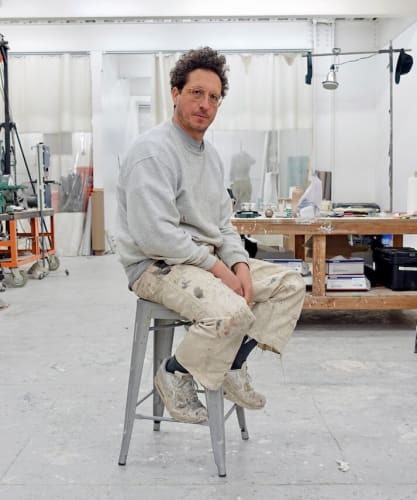Tony Matelli’s sculptures harmonize figurative, botanical, and abstract forms, presenting an aesthetic that is both unsettling and humorous. The artist’s bronze works feature unusual details such as ropes suspended in mid-air or weeds sprouting from the corners of gallery walls. These unexpected elements draw viewers into a state of visual and conceptual disorientation. By challenging traditional genres, Matelli shapes his works on an experiential foundation, ensuring they transcend decorative intentions. For him, art is not merely a formal presentation but a space where ideas find unrestricted expression.
Matelli’s reinterpretation of everyday objects in an absurd and distorted manner is particularly striking. His hyper-realist sculptures create a delicate balance between evoking amusement and discomfort in the viewer. Many of his works employ abstract dimensions and ironic humor while subtly referencing the classical aesthetic of monuments. For instance, an antique bust adorned with a banana or a sandwich may initially seem comical but carries complex underlying themes of human fragility and solitude. This “anti-monument” approach serves as a bold redefinition of American hyperrealism.
Matelli’s sculptures stand out not only for their technical mastery but also for their profound sensitivity to the human condition. Over a career spanning more than 25 years, themes of alienation, vulnerability, and transformation have remained central to his work. Examples include mirrors layered with dusty graffiti or a glass of water precariously balanced in optical glass, which imbue ordinary objects with metaphorical depth. His figurative works also delve into the social dimensions of human displacement and rootlessness.
Born in 1971 in Chicago, Tony Matelli began his artistic education at the Milwaukee Institute of Art & Design, completing his BFA there. He continued his studies at the Cranbrook Academy of Fine Arts, where he earned his MFA in 1995.
Matelli’s works have been exhibited in prominent museums and galleries, including Andréhn-Schiptjenko (Sweden), Real Estate Fine Art (USA), 500 Capp Street (USA), Marlborough Contemporary (UK), The Aldrich Contemporary Art Museum (USA), The State Hermitage Museum (Russia), Gary Tatintsian Gallery (Russia), The Power Station (USA), Concordia (Netherlands), and the National Chiang Kai-Shek Memorial Hall (Taiwan).
Tony Matelli lives and works in New York.
